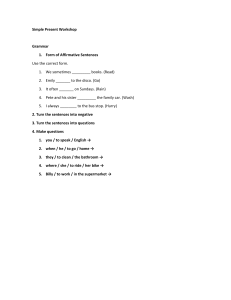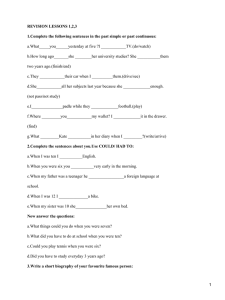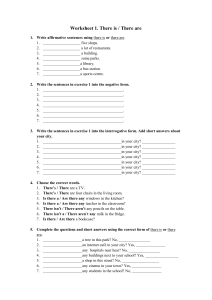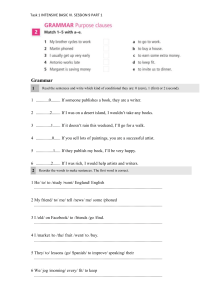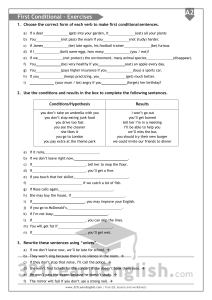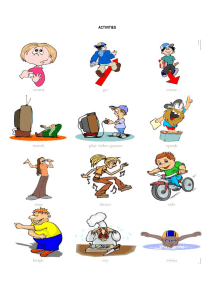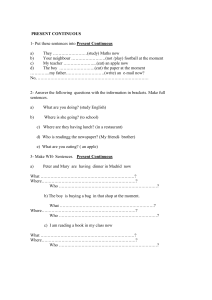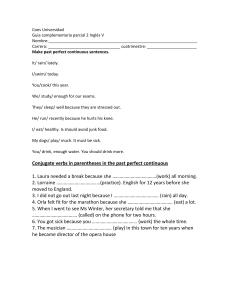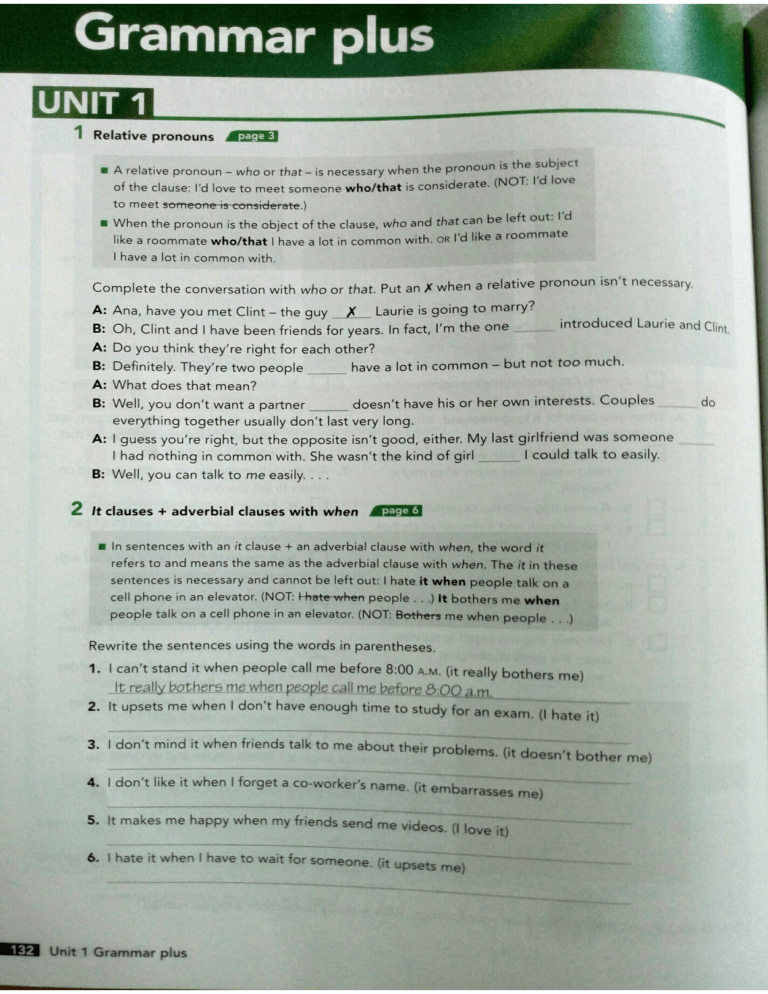
UNIT 1
1
Relative pronouns
._
.
h
un rs the sublect
• A relativa pronoun - who or that - is necessary when t e prono
of the clause: l'd love to meet someone who/that is considerate. {NOT: l'd love
to meet so11 ,eone is considerete.)
.
.
d h t n be left out. 1 'd
• When the pronoun ts the object of the clause, who an t a ca
like a roommate who/that I have a lot in common with. OR l'd like a roommate
I have a lot in common with.
. ,
Complete the conversation with who or that. Put an X when a relative pronoun rsn t necessury.
A: Ana, have you met Clint - the guy
L Laurie is going to marry?
B: Oh, Clint and I have been friends for years. In fact, l'rn the one
introduced Laurie and Clint.
A: Do you think they're right for each other?
B: Definitely. They're two people
have a lot in common - but not too much.
A: What does that mean?
B: Well, you don't want a partner
doesn't have his or her own interests.
Couples
everything together usually don't last very long.
A: 1 guess you're right, but the opposite isn't good, either. My last girlfriend was someone
I had nothing in common with. She wasn't the kind of girl
I could talk to easily.
B: Well, you can talk to me easily ....
2
lt clauses + adverbial clauses with when ~
• In sentences with an ,t clause + an adverbial clause with when, the word it
refers to and means the same as the adverbial clause with when. The it in these
sentences is necessary and cannot be left out: 1 hate it when people talk on a
cell phone m an elevator. (NOT: 1 hete when people ... ) lt bothers me when
people talk on a cell phone m an elevator. (NOT: Bother, me when people .
)
Rewrite the sentences using the words in parentheses.
1. 1 can't stand 1t when people call me befare 8:00 A.M. (it really bothers me)
le. í eally bot.h~rs_m,- ~he-tl peQpl~ ~ 1ll rl1c;. lJ t~rc l?·QQ ,11
2. lt upsets me when I don't have enough time to study for an e
3. 1 dont rrund rt when Iriends talk to me about their probl
4. 1 don 't 1,ke 1t when I forget a co-worker's name (it
·
S. lt mak.es me happy when my friends send me vid
6. 1 hate it when I have to wait for someone (it u
·
..
.
,
' )
., ,l
Unit 1 Grammar plus
emb
eos.
(I
xam.
(' d
ems. •t
(I
psets me)
.
ate it)
,
oesn t bother me)
arrasses me)
I ove it)
h
do
1
Gerund phr
5
s ~
• A g r uud
f hr
-.J
r w r lJ111c11l•ll (N01
I 1 ci l k
in91.1l
1 k IIHJC1111l,l11l1l,,1,•1
v rl:1 1 kln I
r
f t l jr r1 1
1
u
1 1 1 w 11 r 1 111 1 1 b )
• Th r
,
or n, l(1n1111on veril 1 1111•¡11,.,111on e>X¡11
1
b ti
111.
11111 (lor
l!11niil ,d,
•
zour. ce '" '. In 1 k >llc1,11, lhrnk nl>tHII) ,111tl rl e 11
1
e amplo goodfl1 d
.
1
v
1>r1 po .uon pl1r
(f r
•
n at, C'.)(c1t{)c/ l1y/.,t,0111. 1111 .. ,1 Sf(o1/ 111 I '" el ol, lll!i ,/ 1,1) th l r
Iollowod by CI qcrund: l'm thlnklng about I 00 kl
f
working lonq hou, s.
•
ng or ti" w 101:'> 1'111 tlred of
11
II
Complete the sentences wuh th e cor, oct qerund fo, rns of tho vr-r IJ•,
./ become
change
have
make
stand
travel
learn
solve
take
work
1. My brother's very interested in
He dreams about
ti,
box •
becomi11g
a flight artcndant.
to new places
a Japanese class next scmester.
2. l'm excited about
I enjoy
3. You wouldn't like
--~
111
languages.
in a restaurant. You'd gel ured of
on your feet throughout the long shifts!
4. Our teacher is very good at
problems. Maybe she should
think about
careers to become a guidance counselor
a living as a photographer could be challenging.
s.
-----------
an impressive portfolio is really important to attract
new clients and employers.
2
Comparisons
page 11
• When making general comparrsons with count nouns, use a/an + singular noun
or no article + plural noun: A pilot earns more than a flight attendant. Pilots
:rne
earn more than flight attendants. (NOT:
pilots earn more than
tne flight
attendants.)
Make comparisons with the information below. Add articles and other words when necessary.
1. architect / more education / hairstylist
An architect needs more education than a hairstylist.
2. college professor / earn more/ elementary school teacher
3. nurses / worse hours / psychiatrists
4. working as a police officer / as dangerous I being a firefighter
-------------
-
--
S. taxi driver / not as well paid / electrician
6. being
----a tour qurde / less interesting / being an actor
Unit 2 Grammar plus
1
•:D·t IP
Requests with modals, if clauses, and gerunds
• Use the simple past form - not the gerund or simple present form - af ter ,f with
Would you mind ... ? and Wou/d ,t be al/ r,ght . . ?: Would you mind if I used
your car? Would it be all right if I used your car? (r-JOT: Would you mind ,f I
us,ng your car? OR Would it be all right if 1 ese your car?)
Read the situations. Then complete the requests.
1. You want to borrow a friend's underwater camera for a divinq trip.
A: l was wondering if I could bQrrow yQur underwat~r camer~~
8: Sure. That's fine Just please be careful with it.
2. You want to use your roommate's computer.
A: Is it OK
8: You can use it, but please dori't drink near it.
3. Your neighbor has a car. You need a ride to class.
A: Would you mind _
------------
8: l'd be glad to. What time should I pick you up?
-------
4. You want your brother to help you move on Saturday.
A: Can you
8: l'rn sorry. l'm busy all weekend.
S. You would like a second piece of your aunt's cherry pie.
A: Would it be all right __
8: Yes, of course! Just pass me your plate.
6. You want to borrow your cousin's red sweater.
A: Could you
_
8: Sorry. 1 don't like it when other people wear my clothes.
2
lndirect requests
~·ft·t#J•l
• In indirect requests with negative infinitives, not comes before - not between the infinitive:
Could you tell Allie not to be late? (NOT: Could you tell Allie
to not be late?)
Complete the indirect requests. Ask someone to deliver the messages to Susie.
•
Could Y0!.1 ª~k
•
Can
•
Can
4. Do you know my address?
•
Can
S. Don't forget to write.
•
Could
6. What are you doing Saturday?
•
Can
7. Do you have plans on Sunday?
•
Could
1. Are you busy this weekend?
2. Do you want to hang out with me?
3. Text me.
Unit 3 Gras,,mar plus
Sus1e if f:Jhe'~ bus_y thie w~cken.d?
1
Past continuous vs. simple past Jl:iJ;t fil
Verbs for non-actions or states ar e , arel y u sed in the f).ist cont,nuou
to stop, but I couldn't. (NOT: 1 w8~wentin9 to stop ... )
I wanted
Circle the best forms to complete the conversations.
1. A: How did you break I were you breaking your arm?
B: lt's a crazy story! Ramon and I rode / were riding our bikes in the park when a Ce t
ran I was running out in front of me. 1 went / was going pretty fast, so when I
tried I was trying to stop, 1 went / was going off the road and fell J was falling
A: That's terrible! Did you go / Were you going to the hospital after it happened /
was happening?
B: Yes. Luckily, we weren't / weren't being too far from City Hospital, so we went /
were going there.
2. A: You'II never guess what happened / was happening to me this morning!
B: What?
A: Well, 1 brushed / was brushing my teeth when suddenly the water went /
was going off. 1 had / was having toothpaste all over my mouth, and I couldn't
wash it off.
B: So what did you do / were you doing?
A: Fortunately, 1 had / was having a big bottle of water in the refrigerator,
so I used / was using that water to rinse my mouth.
2
Past perfect
page 25
• Use the past perfect to show that one past action happened before another
past action:
I wasn't able to pay for lunch because I had left my wallet at work.
PAST
X
X
had left my wallet
wasn't able to pay
NOW
Combine the two ideas into one with a past event and a past perfect event.
Use when or because.
1. The museum closed. A thief stole a famous painting earlier.
The mu~eum clo~ed becauee a thief had 2tolen ~ famQu~ pªintin0 e~líer.
2. We finished cleaning the house. Then our guests arrived.
3. Someon; robbed my house yesterday. 1 left the window open.
4. There was no food in the house. We forgot to stop at the supermarket.
S.
1
called her three times. She finally answered.
------------
- ----
6. 1 knew about the problem. Your brother told me about it.
Noun phrases containing relative clauses
a:D·t fll
• The relative pronoun who or that can be lef t out in noun phrases as subjects and
as objects. These four sentences have exactly the same meaning: One th1ng l'd
be nervous about is getting lost. One thing that l'd be nervous about is gett1ng
lost Getting lost rs one thing l'd be nervous about Getting lost is one thing that
l'd be nervous about.
Answer the questions using the words in parentheses. Write each sentence two ways.
Leave out the relative pronouns.
lf you went to live in a foreign country, ...
1. Who would you miss a lot? (person: my best friend)
a.
b.
One person l'd miss a lot i~ m~best_fr_ie_nd_.
_M_y_be~t friend i~ one p~r5on l'd miss a!_ot.
_
2. What would you be very interested in? (things: the food and the music)
a.
b.
3. What would you be worried about? (something: not understanding the customs)
a.
b.
4. Who would you stay in touch with? (people: my brother and sister)
a.
b.
5. What would you feel insecure about? (thing: speaking a new language)
a.
b.
2
Expectations
page 33
• Use the base form of a verb - not the gerund - after these expressions for
be the custom to, be supposed to, be expected to, be acceptable
to: lt's the custom to arrive a little late. (NOT: lt's the custom to erriving a
expectations:
little late.)
Complete the sentences with the clauses in the box.
it's not acceptable to show up without calling first.
it's the custom for them to sit across from each other.
you're expected to reply within a few days.
you're supposed to bring a gift .
./ you'nt supposed to shake his or her hand.
1. When you meet someone for the first time, y_ou re 2l!f?posed to ehake h1s or her hand
2. When a friend sends you an email,
3. lf you want to visit someone,
4. lf you invite a married couple to dinner,
5. When you go to a barthday party,
' _· r.
Un1t S Grammar plus
UNIT 6
-
1
1
--
--
Describing problems 1
• Th lrnple r. t nd th 11 t p , t 1pl
f r 1 11
th v
1 hl , , 1 ch1pped
1\1 n uro ul
p
t
nd I
Cornplc lP thc
are stained
has a chip
I f
f
r t 1 'I I
convoi
r rn
I tore m 1 , k
sations with the
has a dent
has a stain
c1 ...11t\ el
B: And they
h
~1y 1 , k t
I
chlpped
t
ffn.,,.,, ...
rl
I
torn
is broken
is leaking
is a hole
111\16 1
rl
words 1,0111 ti, bo
./ have a tear
1. A: Oh, no! These jeans
2. A:
B:
3. A:
B:
4. A:
B:
t
1
le 1r
is scratched
some damage
in them.
too
This table has
ontop
because rnv son drags his toy cars on it.
1 know. The wood
in I t.
~·~
Why are you drinking out of that glass? lt
Oh, 1 didn't see it. That's why it
•
in it.
Someone hit my car today. Look! The door
1 see that. Your back light
, too
S. A: 1 bought this blouse yesterday, but I have to take it back. There
-
--
B: lt's really cute, but that's not the only problem. lt
2
Describing problems 2
on it, too.
- in it.
pa e 39
• Use the past participle - not the present participle or gerund - with passive forms:
The oven needs to be fixed. (Nor: The oven needs to be fixing.}
Complete the conversation with the verbs in parentheses.
Use need + passive infinitive in A's lines and need + gerund in B's lines.
neetiS to
A: Look at this place! A lot of work
B: You're not kidding.
1
cione _
Let's make a list. First, the walls
A: Right. And the windows
lt really
B: No,
l.,c
(do} befare we move in.
nec~d J6.1intin~ __
{paint}.
{wash). Add the rug to your list:
(clean). Do you think it
{dry-clean)?
think we can do it ourselves. lt
(shampoo).
We can rent a machine for that.
A: And what about the ceiling fan? 1 think it
(replace}.
Fans aren't too expensive.
B: OK. l've added it to the list. And what should we do with all this old furniture?
A: lt
(throw out)! 1 think the landlord should take care of that, though.
Complete the blog with the correct form of keep and the verb in parentheses.
I
keep hav,1ng
(have) technical problems. My computer
and my printer
battery .nto my mouse because it
{stick), too. 1
but they just
(jam). 1 have to
(crash),
(put) a new
{die). The letters on my keyboard
(think) things w,11 get better,
(get) worse. Time for some new electron,cs!
UNIT7
1
Passive with prepositions
.411:Wi &f1
• The preposit,ons by, as a rosut: oi, because o(. tho1Jgh, and du to t v
meanings. They are used m sentences that describe cau e and off et,
introduce the cause.
Match phrases from each column to make sentences (More than one answer may be pos.... oe
2
Subject
Effect
Cause
1. The environment ---
is being contaminated
dueto
irnproper d sp~xi r. f
medica! v,a~te
2. Our soil
is being harmed by
dt:?fores1-a~·on te, ma"e
paper prod.;cts.
3. lnfectious diseases
are being endangered
dueto
h Jbr•d cars.
4. Many different species
has been aff ected
because of
the use of pes+" cidc::~ en
fruits and ,ege1-.ables.
S. Our air quality
has been reduced as
a result of
the destruction of the"r
habitats.
6. Smog pollution
have been spread through
--
climate changes li~e
global warming.
lnfinitive clauses and phrases ~·Ei·i·i·t4
• The form of be that follows the first infinitive must agree with the subject:
The best way to reduce pollution is to improve public transportation.
sur The best ways to reduce homelessness are to build more public housing
and provide free health care.
A
Match the phrases.
1.
2.
3.
4.
s.
B
What are the best ways to make
e
a. people safer is to make the air healthier.
And the best way to do that is
b.
The best ways to reduce
c. people's quality of life is to help them feel safe.
One way to improve
d.
Another way to make
e. this city a better place to live?
to create a larger police force.
air pollution are to ban cars and control industry.
Complete the conversation with the sentences above,
A:
What are the be~t, ways to make thle c;ity ~ better place
8: Well, ---~A: That's right.
8: 1 agree.
to 1 "ez
_
,
A: Yes. Good air quality is key. ---------------8: Maybe it's time to share our ideas with the mayor. Get out your phone.
U.lit 7 Gr.nmar plus
1
Wou#d rather and wou#d prefer
.41:l@i fi•
• In negative staternents wlth wou/d ,ather and wou/d prefer, the wor d not come
after the verbs· l'd rather not/l'd prefer not to take any courses this semester
(NOT I v't'ouldn't rether/1 v'O'ouldn't prefer to ... )
Wnte questions and responses using the words in parentheses.
1. A: Would~ou prefer to take cl'ªsses durin@ the day or at night?
(prefer / take classes / during the day / at night)
8:
(rather / take classes I at night)
2. A:
(rather / study I business I education)
(prefer / become / a teacher)
3. A:
(prefer / sign up for I an art course / a computer course)
B: ~~~~~~~~~~~~~~~~~~~~~~~~~~~~~~
(prefer / not / take / any classes this semester)
4. A:~~~~~~~~~~~~~~~~~~~~~~~~~~~~~
(rather / take up I an individual sport / a team sport)
(rather / not I take up / either)
2
By + gerund to describe how to do things
page 53
• In negative sentences that express comparison with by + gerund and but, not
comes befare by: A good way to improve your accent is not by watchlng TV
but by talking to native speakers. In negative sentences with by that give advice
without a comparison, not comes after by: A good way to improve your accent is
by not imitating non-native speakers.
Combine the two ideas into one sentence using by + gerund.
1. You can build your vocabulary. Write down new words and expressions.
One way to build your vocabulary is by writinadown new wQr~~ ID:Jd
expressjons.
2. There is a good way to improve your accent. You can mimic native speakers.
3. Students can improve their listening skills. They can listen to English-language podcasts.
4. Hardworking
students improve their grammar. They don't repeat common mistakes.
5. You can become fluent. Don't translate everything. Try to think in English.
6. You can become a good conversationalist.
Talk to yourself when you're alone, too.
Don't just talk with others.
UNIT9
1
Get or have something done
•DI fj·J
• Sentences with getlhave + obie
,
J et + past partrc,ple are passive. sur Don't use any form
o f b e b e f ore t h e past participle· Wh
·
ere can I have my watch fixed? (NOT. Where can I
have my watch be f1xed?)
Rewrite the statements as questions with Wh
tlh
Then complete B's answers ith h . f
_ere can I ge ave ....
w1 t e rn ormat1on in parentheses.
1. 1 want to have someone shorten these pants.
A:
Where can I have thes~nts shortened?
B: You can hav'e them shQrtened_at Tim'~-Tailori_Q@.
2. 1 need to get someone to repair my computer.
A:
B:
7
(at Tim's Tailoring)
~~~~~~~~~~~~-
--~~-----------------3. 1 need to have someone prepare my taxes.
(at Hackers lnc.)
A:
B:
~-------------------- (by my accountant)
4. I' d like to get someone to cut my hair.
A:
B: ~~~~~~~~~~~~~~~S.
1
--:---:------------------need to have someone paint my apartment.
A:
(at Beauty Barn)
-----------------~
B: ---------------------
2
Making suggestions
(by Peter the Painter)
~·Ei·ti·)•
• Use the base form of a verb - without to - after Maybe you could ... and Why don't
you ... ?: Maybe you could join a book club. (NOT: Maybe you could to join a book
club.) Why don't you join a book club? (NOT: Why don't you to join a book club?)
Complete the conversations with the correct form of the verbs in parentheses.
A: l'm having trouble meeting people here in the city. Any ideas?
B: 1 know it's hard. Why don't you
good place to meet people. Or maybe you could
at the community college.
A: What about
good way to meet people?
(join) a gym? That's usually a
(take) a class
(check out) the personal ads? Do you think that's a
B: 1 wouldn't recommend doing that. People never tell the truth in those ads. But it might
be a good idea
(find} a sports team. Have you thought about
{play) a team sport - maybe baseball or volleyball?
A: l'm not very good at most sports, but I used to play tennis.
B: There you go! One option is
and see which clubs have teams people can join.
(look up) tennis clubs in the city
A: Now, that's a great idea. And I could always use the exercise!
UNt 9 Gnmnw
pus
UNIT 10
1
Referring to ti
• Use s.nce
with
r
.
<
J),
1 lll
ular urn .lh
UNli
I :> n
1 he UN has be ",
111
l<I t
U se ro, with a d ur at icin ot t11n
" ' lnc 194
II exi rene
for b
I ast 70 years.
• Use ,n and dunn
.
out th
.
g with a specific
. d
tn/during the 1950 s.
peno of time Rock 'n' r o II b ecame poouta-
°
• Use from and to t d escribe when so
h
met ,ng began and ended: World War 11
1 asted from 1939 to 1945.
Complete the conversation with the words in t h e box. (Use sorne of the wo d
ago
during
for
f
.
.
r s more than once l
rom
in
smce
to
:: ~;y, Dad. Did you use to listen to the Beatles?
course. In fact, 1 just listened to one of
.
Do you realize that the Be ti '
.
the1r records a few days
a es s rnusrc has infl
d h
over 50 years? They we th
uence ot er musicians
·
re e greatest!
A: Well, 1 just found sorne interestin informa .
Beatles were a well-known British band
tion about them. 1'11 read it to you: "The
together
10 years -
1970.
the original members had
2i~:~
~:a:eatles released
the 1960s. They performed
Let
_______
1960
it Be, even though one of
1980 and another had died
.
2001. The original album had been recorded
and was
m the studio safe
was
released."
34 years before the
B: That is interesting.
--------
2
19
- album 69
new, remixed
lt's pretty amazing that people have listened to the Beatles
both the twentieth and the twenty-first centuries, isn't it?
Predicting the future with will
pa e 67
• In sentences referring to time, the preposition by means "not later than." Don't
conf use by with within, which mea ns "sorne time during." Use by with points in
time; use within with periods of time: By 2050, we will have eliminated starvation
Wrtl"l,n 2050, ... ) Within the next five years, people will
have invented mobile phone apps for nearly everything! (NOT: By the next
around the world.
{NOT:
five years, ... )
Circle the correct verb forms to complete the conversation.
A: What do you think you will do / will be doing five years from now?
8: 1 rn not sure. Maybe I will get I will have gotten married by then. How about you?
A: 1 will be finishing / will have finished medica! school, so I will be dolng I wlll hmve dM9
rny
internship
five years from now.
8: So you won't be living/ won't have lived around here in five years, 1 guess. Where
do
ou think you will live
will have lived?
A: Wherever I get my 1nternsh1p.
UNIT 11
1
Time clauses
.41·i·f ·( ftJ
• Use the past perfect in the main clause with unt,/ and by the time. Thrs shows
that one of the past events happened before the other: Until I got my driver's
license, 1 had always taken public transportation. By the time I got my driver's
license, ali of my friends had already gotten theirs.
Crrcle the correct time expression to complete each sentence
1. After /~1 traveled overseas, 1 hadn't known much about different cultures.
2. After / Before I got a full-time job, 1 had to live on a very limited budget.
3.
4.
S.
6.
2
By the time I Once I finished high school, 1 had already taken three college courses.
As soon as I Before I left for college, my mother turned my room into her office.
Once I Until I left home, 1 realized how much my family meant to me.
By the time I The moment you have a child, you feel totally responsible for him or her
Expressingregret and describing hypothetical situations
pa e 75
• Conditional sentences describing hypothetical situations often refer to both the
present and the past:
lf l'd finished college, l'd have a better job now.
past
(NOT:
A
present
lf l'd finished college, I'd heve heda better job now.)
Write sentences with should (not) have to express regret about each person's situation.
1. Sarah was very argumentative with her teacher, so she had to stay after school.
Sarah shouldn't have been argumentative with her teacher.
_
2. lvan didn't save up for a car, so he still has to take public transportation.
3. Jon was very inactive when he was in college, so he gained a lot of weight.
---
-
4. Lisa didn't stay in touch with her high school classmates, so now she has very few friends.
--
---
5. Tony didn't study Spanish in school, so he's not bilingual now.
-
~---
B
-
Rewrite your sentences in part A, changing them to hypothetical situations.
1.
lf Sara~, hadn't; been ar.gumentative wit~1 herteac~1er._sh~wouldn't have
had to s.:tª-Y after ~ch,QQJ.
2. ------~
3.
4.
---
s.
Un1t 11 Grammar plus
--
1
Describing purpose
.::O·t j1·J
• Don't us e ~or ·1mmed1ately b f
n d I
e OrP an iníiniuve T h
ee a ot of luck. (tJOTº For
h
o ave ' r,qr, • 1 ul bu mes ..
.
to uve a successí ul b
, you
C
1
,
usmes ·,, you need • lot of luck l
1 omp elte tdhesentences with in order to or in order for
n or._ er-- for
2·
.
3.
a supermarket to succeed it has to b
stay popular a web it
, d
e clean and well orqanized,
,
st e nee s to be ac
t
d
run a profitable fur .
,
cura e an vrsually anracnve
a resta
4.
t
ruture store, rt s rmportant to adveruse on TV
uran to stay m business, rt needs to have "regulars" - cus. t omers
that come often.
s.
establish
nail sa 1 on, .it has to have a convenient location
an
1· ab successful
.
6.
h
on me usmess to survi
·
d
o t e merchandise it's selling.
rve. rt nee s to have excellent pictures
f
B
Rewríte the sentences in part A without In order.
For a sur;2ermarket to succeed, rt
. has
1·
to b_e clean and weJl~n1zed
2.
3.
4.
s.
6.
2
Giving reasons
page 81
• Because and smce have the same maarunq, and they can begin or end a
sentence
restaurant.
Because/Since the food is always fantastic, Giorgio's is my f avorite
=
Grorqio's rs my favorite restaurant because/since the food is
always f antas tic.
• Don't conf use beca use and beca use of. Beca use introduces an adverb clause
and rs followed by a subject and verb, while because of is a preposition and 1s
followed by a noun obJect Because G1orgio's is so popular, we should get there
early G1org1o's rs popular because of its food and service.
Crrcle the correct words to complete the conversation.
A: 1 had to go downtown today because I because of I due to I needed to mail
a package at the post office. Dueto I For I Since I was only a few blocks from
Main Street, 1 went over to Martin's. D1d you know that Martin's has gone out of
business? l'm so upset!
B: That's too bad, but l'm not surpr1sed A lot of fam1ly-owned shops are closlnq
because / because of l since the construct1on of shopp1ng malls.
A: Yeah, and don't forget about ali the megastores that are popping up everywhere.
Because For / The reason why people prefer to shop there rs to save money
E eryone leves a megastore 1,ecause /dueto I sine• the low proces and the
huge se ect on
B: ot me I loveo Mart n's for I since I the reason that the r beaut,fu clothes
a d I end y sa espeop e When you were there you a most fe t ke famoly
Yo
never get
t
•
at a megastore
UQt120---
...
UNIT 13
1
Past modals for degrees of certainty
~t
j:r4
• Use the past modal cou/d have to express possibility. aur Use cou/dn't have when
you are almost 100% sure something 1s impossible·
1
suppose he could have
gotten stuck in traffic, but he couldn't have forgotten his own birthday party.
Complete the conversations with past modals must (not) have, could (not) have, or maylmight (oot)
have. Use the degrees of certainty and the verbs in parentheses. (More than one answer may
be possible.)
1. A: Yoko still hasn't called me back.
8: She might not have gotten
2. A: What's wrong with Steven?
your message. (it's possible - not get)
8: Oh, you
certain - not hear)
3. A:
1
the news. His dog ran away. (it's almost
went to see the larsens today, but they didn't answer the door.
8: Was their car there? lf so, they
(it's possible - be)
in the backyard.
4. A: Fabio said he was going to the party last night, but I didn't see him.
8: Neither did l. He
there then. (it's not possible - not be)
S. A: 1 can't find my glasses, but I know I had them at work today.
8: You
them at the office. (it's possible - leave)
6. A: Marc's new car looks really expensive.
8: Yes, it does. lt
2
a fortune! (it's almost certain - cost)
Past modals for judgments and suggestions
.azta:,·J
• In advice with would have, the speaker means, "lf I were you, ... "
Read each situation and choose the corresponding judgment or suggestion for
an alternative past action.
Situation
1. Sue forgot her boyfriend's birthday.
Judgment/Suggestion
b~
a. 1 wouldn't have lent her money.
2. T1m gota speeding ticket. -~
b. She should have put it on her cal
3. Ruth still hasn't paid me back.
c. He should have told the truth.
4. Bill lied to us.
d. He shouldn't have gone over the l
S. 1 spent an hour making Joe dinner,
and he didn't even thank me.
e. She should have brought somethi
6. Carel carne over for dinner empty-handed.
Uwwt 13 Grazaw, sr ph•
f.
1 wouldn't have cooked for him.
U,NIT 14
1
The passive to d scribe process
•w 11ii
• lik
rh
morl ils /1 ' rvo 1 0 r111c 1 11ouc/ 1n 11111 1 !Jtf
,11ay be, hnvo l111ly ono I n1 "' 1 .ic,;h cliar
t I ie r nuuator s.
rl'
with th
,11
te, ha, to/n
t, oth r m
,
ds to b dr
,n y
Put the words in the correct order to make sentencos.
1.
overruqht / business / A/ started / small / isn't / .
A sn1r1II busíness ic;n·~ c,l.~rted overntqht,
2. to / plan / business / a / written / First, / be / has/ .
3. research / Next, / done / be / market / should / .
4. needs I competition /to/ the / Then / identified ¡be¡
S. online I ads I posted / be / Classified / may / .
6. work I are I employees / hired / can / start / the / so/ Finally, / .
2
Defining and non-defining relative clauses
pa e 96
• Use either who or that in defining relative clauses about people: A set designer
is an artist who/that makes important contributions
to a theater production. eur
Use only who in non-defining relative clauses about people: A set designer, who
makes ,mportant contributions to a theater production, has to be very creative.
(NOT
A set designer, thet makes ...
)
• Use commas before and after a non-defining clause: A gossip columnist, who
writes about celebr,ties and scandals, often gets to go to fabulous parties.
Combine these sentences with who or that. Add a comma wherever one is necessary.
1. A cartoon animator creates animated scenes for movies and games. He or she needs
to have a h,gh level of technical know-how.
A cartoon an1n1at-0r:. who n~~s tQ_have a high level of tee_hn1cal know-how, crª~tc~
~nimated ~cene~ for n1oviª~~nd games
2. A screenwriter is a talented person. He or she develops a story idea into a movie script.
A.. ~,reer1wri~r Is?) tªlented pe~·Qn tha t dev~lop
J. Voice-over
a ~tol:I
idea into zi mQvle ;;cript
actors are usually freelancers. They give voice to characters in animated
movies and video games.
4. Casting directors choose an actor for each part in a movie. They have usually been
in the rnovre business for a long time.
S. High-budget movies always use big stars. The stars are known around the world
6. Mov,e dírectors are greatly respected
They "make or break" a film.
Unit 1 •
CimNW,....
UNIT 15
1
Giving recommendations
and opinions
..
:Eft IJ•I•
Ought to has the same meaning as should, but it's more formal.
Traffic srqns ought to be obeyed. == Traffic siqns should be obeyed.
A student comm1ttee rs discussing rules for their school. Complete speaker B's sentences
wrth appropr1ate passive modals. (More than one answer is possible.)
1. A: Students must be required to clean off the cafetería tables after lunch
B: 1 disagree. Students
shouldn't_be r~quir~d- to do that. That's what the cafeteria
workers are paid to do.
2. A: Teachers shouldn't be allowed to park in the student parking lot.
B: Why not? Teachers
After all, they're here for us.
to park wherever a space rs available.
3. A: A rule has to be made to ban the use of cell phones in school.
B: 1 don't think a rule
. Students may need their phones for
emergency purposes.
4. A: Students mustn't be permitted to use calculators during math exams.
B: Sometimes we
to use them, especially when we're beinq
tested on more complicated concepts than simple arithmetic.
S. A: Something has got to be done to control the noise in the hallways.
B: Students
to talk to each other between classes, though.
They aren't disturbing anyone when classes aren't in session.
6. A: Teachers must be required to remind students about important exams.
B: That's unnecessary. On the contrary, students
to follow
the syllabus and check important dates on the course websites.
2
Tag questions for opinions
~:lZiiJ•fl
• Tag questions added to statements in the simple present and simple past use
the correspond,ng auxrliary verb in the taq: You agree with me, don't you? You
don't agree with me, do you? You paid the rent, didn't you? You didn't pay the
electric bill, did you?
Check (./} the sentences if the tag questions are correct. lf they're incorrect,
write the correct tag questions.
1. Food is getting more and more expensive, i it?
2. Supermarkets should try to keep their pnces down, shouldn't they?
3. People don't buy as many fresh Iruits and vegetables as they used to,
don't they?
4. We have to buy healthy food for our children, don't we?
5. Many children go to school hungry. won't they?
6. Sorne people can t afford to eat meat every day, don't they?
7. We can easily ltve without eatmq meat every day, can we?
8. A lot of people are hav ng a hard t me rnakinq ends meet these days
ha" en't they?
Unn 15 Grammar plus
--
·-
-
-
UNIT 16
1
Talking ab
t
• ·r lt•íA
• When talking about past accom l,shm
simple past - not the present per f
elnts and ,nclud1ng a spec fic tame se
r ect: was able t
t
year. (NOT: l!.ve been able to
I
o comp ete my degree st
comp ete my degree last year.)
Cnompleteh the sentences about people's accompl,shments
I
parent
(M
eses.
ore than one answer is possible.)
In the last S years, Ana ...
1 · - managed to ftnish
Use the /erbs
(finish) college.
2.
3.
4.
5.
(pay) all her college loans.
(start) her own company.
(move) to the city.
(make) sorne new friends.
In the past year, Bill ...
(buy) a new car.
6.
7.
8.
9.
(take) a vacation.
(get) a promotion at work.
(learn) to cook.
(visit) his grandparents in the south.
10.
2
Describing goals and possible future accomplishments
~·ft·hik•kl
• When talking about future accomplishments and goals, use in to refer to a
period of time: 1 hope 1'11 find a new job in the next two months. Use by to
talk about a time limit in the future: 1 hope 1'11 find a new job by the end of
September. = 1 hope 1'11 find a new job not later than the end of September.
Complete the conversation.
Use the verbs in parentheses. (Sometimes
more than one answer is possible.)
Louise: So, Mike, what do you hope you
will have accomplished
Mike:
1 hope 1
(complete) medica! school, and 1 ---------
Louise:
(start) my residence in a good hospital.
What about your personal goals? What
Mike:
Well, 1 ---1
Louise:
Well, 1 hope 1
and 1
Mike:
Louise:
Mike:
_
--Good plan! What about
(accomplish) five years from now?
(achieve) by then?
(meet) that special someone, and, maybe,
(get) married by then. What about you? What are your goals?
(finish) culinary school in the next five years,
(manage) to work with sorne famous chef.
opening your own restaurant?
That will take sorne more time, but by the time l'm 35, 1 hope I
(open) my own bistro - Chez Louise.
1 can hardly wait. 1 just love your food.
